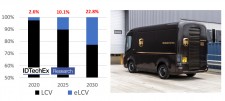Global Production of Electric Light Commercial Vehicles to Exceed 2.4 Million Units Annually by 2030 Forecasts IDTechEx

BOSTON, February 27, 2020 (Newswire.com) - The light commercial vehicle market is at the dawn of a revolution; the future is electric. The main discourse around on-road vehicle electrification has been primarily focused on environmental concerns about the automotive sector’s contribution to climate change and the damaging effect on human health of exhaust pollutants. For businesses keen to address the environmental impact of their vehicle fleets a degree of altruism has always been required. In the electric light commercial vehicle market, this is about to change. In the near future, the main motivation for businesses to transition to eLCV will not be environmental but economic.
To help companies plan for the changes in this market, the newly launched IDTechEx report “Electric Vans 2020-2030” provides a detailed ten-year outlook for the uptake of electric light commercial vehicles across key regions; China, Europe, North America and the rest of the world, outlining eLCV production, penetration, market revenue and battery requirement. This report will be of value to companies across the automotive industry including OEMs, battery manufacturers, electric drivetrain parts and systems suppliers, materials and research organizations, charging infrastructure developers, government agencies and companies with significant LCV fleets.
The light commercial vehicle market is uniquely positioned to rapidly transition to electric vehicles. LCV operators primarily base their purchase decisions on total cost of ownership calculations, and while the upfront cost of electric LCVs is currently greater than for an equivalent diesel model, the significant operational cost saving from using electricity as a fuel, in replacement of diesel, is increasingly being shown to offset the initial price difference.
Over the next decade, as battery pack prices decrease, electric drivetrain efficiencies improve and significant economy of scale savings are realized on the cost of electric components and vehicle manufacturing, it will become a competitive advantage for companies to operate electric vans as they will offer the lowest cost solution. The addition of road charges for diesel vehicles in low emission zones within urban centers will swing the TCO balance heavily in favor of electric LCV.
IDTechEx believes the next few years will see companies conducting large scale pilot projects to establish that eLCVs meet their operational range, load capacity, payload and reliability requirements. Once demonstrable evidence is there that eLCVs can meet the operational requirements without increased cost, then the widespread replacement of aging diesel LCVs with eLCV will begin in earnest. For more information please visit www.IDTechEx.com/eVans.
To find out more about Electric Vehicle research available from IDTechEx visit www.IDTechEx.com/research/EV or to connect with others on this topic, IDTechEx is hosting: Electric Vehicle Materials, 13 - 14 May 2020, Estrel Convention Center, Berlin, Germany www.ElectricVehiclesEurope.Tech.
IDTechEx guides your strategic business decisions through its Research, Consultancy and Event products, helping you profit from emerging technologies. For more information on IDTechEx Research and Consultancy contact research@IDTechEx.com or visit www.IDTechEx.com.
Media Contact:
Jessica Abineri
Marketing Coordinator
press@IDTechEx.com
+44(0)1223 812300
Source: IDTechEx